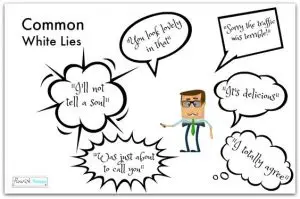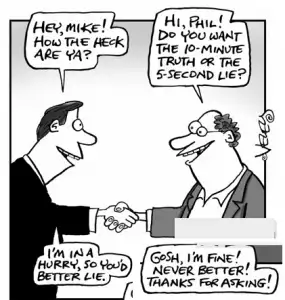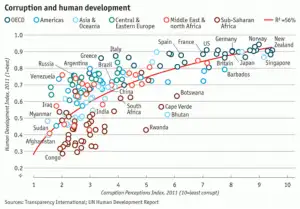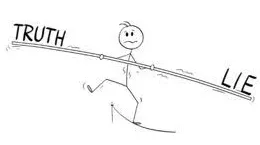When to Lie
“I lie to myself all the time. But I never believe me.”
― S.E. Hinton
I find myself both repulsed and attracted to the idea that lying may be – sometimes – the right thing to do. And yet, in our “post-truth” age lies and deceit seem to be more powerful and effective than ever. Why is that? Do not the obvious successes of science and a free press in rich countries made it clear that lies only lead to ruin and destruction? Clearly not. What follows is an investigation of lying so that we better understand, and thus get less angry, when people lie. For you to get what you want you must realize people lie for many complicated reasons and that lying, sadly, has its necessary place in human behavior. Really, do you think that you could have laughter and humour without some deception – really a form of a lie. Could you get along with many of your friends or family members without white lies? If you love Poker as much as I do you realize that without bluffing [a lie] there is no game – and no fun!

Hypothesis
I have always been taught, and tried to live, as if all lying is “bad”. In spite of this I know that most people lie some of the time – and that this does not make us a ‘bad’ person – as most of us “bend the truth” for what we consider ‘good reasons’ without considering it a “real” lie…ie. It’s only a white lie. Caveat: I am a bad liar and am not supporting lying, but I also recognize that lying has a place in our lives. Here is my proposal: perhaps lying is like war: it is the last resort of the incompetent that happens when trust and communication has broken down or a scarcity of resources has created shortages that mean without war/lying you risk death. Put another way, when there is competition between “us” and “them” for survival lying helps you survive. Included in the for psychological survival by the use of self-deception. However, when cooperation, and thus trust, is essential among “us” lying is a disaster and only causes more suffering and death. So, let’s see if this proposal holds water. What follows is an exploration in the jungle of deception we call lying.

The Battle of Salamis in 480 was won by the Greeks because of a lie
Lies in History
The idea to write about lying came to me when I was reading “100 Mistakes that Changed History” as it explained the Battle of Salamis, 480 BC. This battle was won by the Greeks because of a lie during this pivotal Persian-Greek war. This victory allowed Greek civilization to survive and then dominate the Mediterranean world for the next 2000 years. Here’s what happened. “The Persians had already invaded Central Greece, defeated the Greeks on land at Thermopylae, famous for the heroic stand of the Spartans, had fought the Greeks to a draw at the naval battle of Artemisium, both of these in late August. Now a month later the Persians had invaded Attica, they had burned the temples of the Acropolis to the ground, they had destroyed much of the city, and the only thing that stood between them and further progress to the Peloponnesus was the Greek navy. [2] The Greek navy was trapped by the much larger Persian navy by the island of Salamis. All the Persians had to do was wait and when the Greeks tried to escape ram them into oblivion. In a desperate gambit the Admiral of the Greek navy, Themistocles, sent his most trusted slave, Sicinnus, to tell the Persian Emperor, Xerxes, that the Greeks were in disarray and the Athenians were ready to switch sides and make a deal with the Persians. All of this was a lie, however, Darius fell for it, even when the slave escaped during the night.” The result of the lie was a resounding victory for the Greeks, the end of the Persian invasion and the beginning the tide which led to the Greeks eventually conquering the Persian empire. This battle literally saved Western civilization from oblivion.

Lies in Religion
If there is a God, whence proceed so many evils? If there is no God, whence cometh any good? – Boethius
Clearly History informs us that lies are sometimes very useful. Here is another case, from Religion, where lying paid off big. In the Bible’s Book of Genesis Jacob steals his brother’s inheritance by lying to this father. Now this lie is a big deal because Jacob is the father of 12 sons who become the progenitors of the 12 tribes of Israel.
“Jacob, who became the leader of the Jewish nation – was a “hustler” —a con artist. He took advantage of a weakness in his brother Esau’s character to defraud him. The book of Hebrews describes Esau as “profane,” meaning literally that “nothing was sacred to him.” One day Esau came home famished at the end of a day of hunting and saw that Jacob had made stew. He pleaded for some, and Jacob “sold” it to him in exchange for his birthright, which he knew meant nothing to Esau. But Jacob still had to get the blessing that went with the birthright, and so he also deceived his father Isaac, pretending to be Esau once his father’s eyesight had grown so dim that he couldn’t tell the difference. As a result of this deception, Jacob received his father’s blessing, in God’s name, of both material abundance and family leadership. So why did God honor this blessing, when it was obtained under such fraudulent circumstances? [1]” This last question has many answers and not being a theologian means I will not even try to answer it, however, one thing is clear: sometimes lying is approved of by God.
So, what do these ancient events have to do with us today? Well, given that the foundations of our civilization are Greece/Rome and Christianity the fact that both have, at pivotal events in their history, used lying as a means to achieve a “good end” [ie. What we want], we are faced with the reality that while we are told to “always tell the truth” the reality is far from this ideal…. in certain situations. The trick seems to be, like everything in life, to differentiate when lying is “bad” [eg. Not useful/helpful] and when lying is “good” [eg. useful/necessary].

White Lies
“I’m not upset that you lied to me, I’m upset that from now on I can’t believe you.” ― Friedrich Nietzsche
Now that we have covered the historical-religious examples when lying was “OK” let’s get a bit more mundane and personal. Last night, over dinner, I asked the wife of a good friend if she thought lying was sometimes a good thing. She gave an emphatic “YES!” – lying was AOK when you are trying to avoid hurting people’s feeling AND when that lying does not result in anybody being hurt. She then added that she was sure that people lied often. Why? People believe that the lie does more good than the harm the truth would do. She was also sure that lying was totally normal for people and that most people lie every day – for what they consider good reasons. There is research that supports her point of view that to be human to lie. Here is but one example of such research.
Toddlers who tell lies early on are more likely to do well later, researchers claim.
“The complex brain processes involved in formulating a lie are an indicator of a child’s early intelligence.” [3] In other words, one way we become independent, thinking people is learning to lie: a necessary skill so we can detect lies in others and the world around us. Imagine being so naive that you believed everything other people said: you would, justifiably, be considered a simpleton or a fool. We all need to recognize lies to survive and the only way to have that skill is “practice” ie. Lying. Sadly.

Satanic Leaf-tailed Gecko
Deception and Camouflage in Nature
“Anyone who believes what a cat tells him deserves all he gets.” ― Neil Gaiman
Many plants and animals practice a form of lying: deception by the use of camouflage. Chameleons. Owl Butterfly, Preying Mantis. Horned Owl. Brown Vine Snake. Common brown looper moth… the list is almost endless.
Even quicksand can be thought of as a lie: it looks like solid ground, but it is not, and if you cannot recognize “the lie”, you die. Clearly, Nature revels in deception… in lying. And it is good – because it is survival. In other words, as I stated in my thesis at the start of this exploration, perhaps lying where there is competition between plants/animals lying is not only a successful, but intelligent, strategy, because is uses a minimum of resources and reduces violence and death. Perhaps Nature is informing us that lying is morally “OK” when death and destruction is reduced. Our problem seems to be that when people lie, death and destruction seem to increase. I guess we, as a species, have not figured out how to lie properly.

Is Politeness Mostly a Lie?
The highest perfection of politeness is only a beautiful edifice, built, from the base to the dome, of ungraceful and gilded forms of charitable and unselfish lying. Mark Twain
You gotta love Mark Twain; he knows how to use words to deliver a knock out punch when you least expect it. Here is some support for his point of view. Picture yourself in Versailles, in the Court of Louis XIV. Everybody is stuck in court in fancy clothes. They do not washing. They stinking. Wigs are worn because of lice. What do people do? Take a bath? Heaven forbid! No, some smart guy invents perfume. Wigs mean we can pretend there is no lice. Perfume means we can pretend we don’t stink. In other words, being polite is all about lies, yet necessary for us to get along. And yes, I love your haircut. And you pink poodle too.

Corruption and Poverty
“I don’t like to lie, no. I don’t like to lie, no. It’s something that — it’s not something that I would like to be doing,” Trump said.
When I read the news and see the state of affairs of most countries and the behaviour of many politicians/world leaders it seems we are in a phase of History where many people prefer lies to the truth. However, that does not mean that this is a helpful behaviour. As a matter of fact, I believe that our complex civilization would fall into a heap of ruin quickly if we all lied “for good reasons” because our complex society requires a high degree of cooperation and cooperation requires trust. One support for this proposal is the “Corruption Index” [4] which has shown over and over again the corrupt countries [ie. lying is rampant] are poor and backwards. So, even supposing my friend is correct and lying is “normal” , the data tells us people in a society have to be trained to not lie [mostly] because in the long term it leads to an improvement for common good.
Well, as an educator, I find this point of view satisfying because it supports the idea that the cornerstone of a civilized society is the quality of its education – the education of character specifically. As a matter of fact, right now I am teaching a few high school kids at a small private school an English course which is based upon the old fashioned idea that education is primarily about character. In a classical education the essential ingredient in character building is the reading of “The Great Books” where students learn the ways people in the past grappled with life’s challenges and developed character in doing so. In my English class we have started with Boethius’ Roman classic “The Consolation of Philosophy”. You can find it free online if you are interested. It’s thesis is clear: bad things will happen to you but if you use reason – based upon a philosophy that doing the right thing is the only way to keep your sanity and quality of life worth living – you will, in spite of the nastiness of life, be able to live “the good life”. By the way, that does not include lying – ever. It might help you to know that he was condemned to death by somebody jealous of his high political position who lied to the King when he claimed that Boethius was helping to plan the overthrow of the King. So, in spite of his philosophical stance, lying did pay – for whoever made sure he was killed.
Evolutionary Reasons for Lying
This is a huge topic and well beyond the scope of this exploration. Needless to say there is a lot of research that shows that lying can be destructive in one situation and helpful in another. In other words, like most things in life – it depends upon the context and situation. Recent research also suggests that lying is intimately linked to our communication:
“The rise of lying as a pro-social deed is intimately related with Homo sapiens incredibly broad and complex communication skills.” [5] Not only that, deception and its variant self-deception [all lies] are also advantageous in this way: “Self-deceptive self-enhancement also allows people to display more confidence than is warranted, which has a host of social advantages.” [6] All I can conclude, after having read these papers, is that the recognition and practice of deception and lies are inherently human and are linked to evolutionary advantages that outweigh the obvious risks of lying.

Narcissus staring at his beautiful image until he starves to death
Illusion, Delusion and Narcissism
Above all, don’t lie to yourself. The man who lies to himself and listens to his own lie comes to a point that he cannot distinguish the truth within him, or around him, and so loses all respect for himself and for others. And having no respect he ceases to love.” ― Fyodor Dostoevsky
One of my favourite books is Scott Peck’s “People of the Lie”, written in the 1980s. He writes about the nature of evil and specifically of an “evil” subtype of narcissistic personality disorder which uses of self-deception to keep the emotional consequences of his or her crimes out of conscious awareness. In other words, many “evil’ people can do what they do because they life to themselves. Eventually, of course, they cannot tell the difference between a truth and lie. Eventually, of course, they will lose the ability to distinguish reality from illusion. A certain president come to mind…
Psychopaths and Evil
A true psychopath, who does not have a conscience and does not accept morality, has no need of self-deception and thus has no need to lie. So, real evil, and people who slide into it, just do terrible things and think it is OK and say so. Hitler or Genghis Kahn come to mind. Hitler wrote clearly that he would invade Russia, wipe out the Russians, and populate it with Germans. No lies there. Genghis Kahn’s approach was similarly simple: Surrender or death to everybody. In his first campaign, against an empire in central Asian, he wiped out 2/3 of the population. Why? To set an example: don’t mess with me. So, he did not lie – but does that make him a lover of Truth? Far from it.

Humour & Human Nature
Here is a final twist to make your challenge of knowing when and if to lie is OK a confusing affair: humour, deception/bluffing and a feint [essential to a duel with swords] are essential to life and our psychological sanity and yet, they are, basically, based upon lies. Yet, we all love to laugh, for it can, done properly, bring people together and build trust, even as it inflicts pain with word play – as the example below shows. As for bluffing, what would a game of Poker be without bluffing? As for feints, a good sword fight [ I was on the Queen’s fencing team] is impossible without the feint – actually it is the essential ingredient to any combat. If you had read as many accounts of battles as I have you would realize that any good general, Genghis Khan comes to mind, uses deceptions and feints to win battles. So, it seems that these variations on lying – humour, deception/bluffing and the feint – are part of the human condition and necessary for our very survival.
So, perhaps you will not be as upset the next time some lobbyist claims that Global Warming is a minor challenge. Keep your cool and realize that they have what they consider ‘good reasons’ to lie, however counterproductive. Once we become less moralistic and judgmental abut lying we can understand and analyze it more logically and reduce the damage it does. It helps me to realize that never lying is simplistic, and simultaneously to see that in cultures where lying is accepted as normal your society will most likely be corrupt and backwards and will never become a “civil society”? Well, as I have said before life is uncertain, dangerous, complicated – in short, you are always walking on thin ice.
So what can you do? Think before you lie, or tell the truth – both are dangerous. Learn about the situation in so you don’t over simplify what is probably a complex situation. Figure out when lying is going to reduce harm [which I posit is seldom, unlike my friend] and in doing so you will probably get a bit smarter because this the real challenge is being able to recognize lies, to know when to lie. Hopefully learning to walk in this greyness of truth you will not only get a little smarter but also more compassionate and less judgmental of those who lie because often their self-deception seems necessary to them for their very survival. In conclusion, lying to your family, friends, people you work with, neighbours will erode the trust you need to cooperate for the common good. However, lying to your enemy [Salamis] or because it will benefit your tribe/society [Jacob] seems to be a necessary part of living. I leave you with some sage advice from the Book of Proverbs:
Be as gentle as doves but as wise as serpents.
Good luck walking this tight rope!

- https://goodquestionblog.com/2017/11/17/why-didnt-god-give-esau-back-the-blessing-that-jacob-stole/
- https://www.wilsoncenter.org/event/the-battle-salamis-ancient-lessons-for-modern-statecraft
- 3.https://www.bbc.com/news/10119297#:~:text=The%20complex%20brain%20processes%20involved,study%20were%20able%20to%20lie.
- https://www.transparency.org/en/cpi
- 5. https://www.scielo.br/scielo.php?pid=S2358-18832019000100141&script=sci_arttext
- https://www.researchgate.net/publication/49805033_The_Evolution_and_Psychology_of_Self-Deception
“Just because something isn’t a lie does not mean that it isn’t deceptive. A liar knows that he is a liar, but one who speaks mere portions of truth in order to deceive is a craftsman of destruction.” ― Criss Jami
Leave a Reply